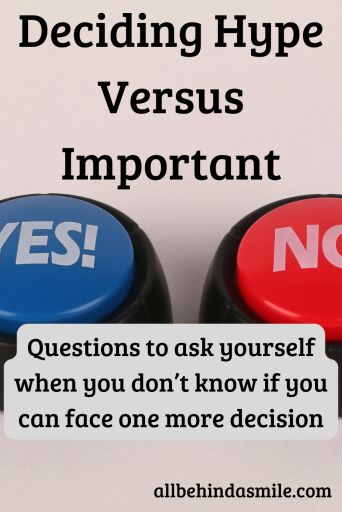Everywhere we look as mothers, there’s another decision to be made. Eventually, we need to learn to distill down the decision making process to help us with the big question: what is hype versus important (to me and my family)? With so many questions and so few definite answers – and most answers changing from family to family – we have to be able to do this.

Inability to distinguish between the hype versus the important decisions can not only lead to a lot of stress and overwhelm, but also burnout… from thinking *everything* is important and reacting as such.
Defining Our Terms
Although definitions may vary somewhat, in this particular instance the term “hype” is being used to describe over-exaggerated issues that look important but really aren’t (or aren’t specifically important to us and our family’s circumstances).
“Important”, in this particular article, is only referring to personally important, or important to ourselves and our family. We do not define important for another person, or another family – because everyone’s circumstances and mentality are different.
Differentiating Between Hype Versus Important
There is no one size fits all approach to what is going to matter to you and your family. Because when you distill it all down, what is important depends on so many different factors, that no one’s will be exactly the same. In the end, though, we can ask ourselves questions about the situation to help us determine on which end of the spectrum it falls in our judgement (which may change over time).
Questions to Ask Ourselves
- Why does this feel important?
- Is it because someone else thinks it is?
- Does it impact me or my family directly?
- If not, who will it impact?
- Is this something that needs to be dealt with (by me) at some point?
- Will my decision create a ripple effect?
- What will happen if I don’t respond to this situation?
- Will the situation progress and get worse if I delay responding/don’t respond, or will it stay the same? Could it improve if I wait?
Although there are more questions that could be asked, the above questions can get your gears started turning.
Enjoying this article so far? You may also enjoy Independent Living Skills (for Adults), which opens in a new tab and includes five less common tips while focusing on helping those with mental illness thrive without the institutional setting.
Making Use of the “Questions to Ask Ourselves”
A list of questions is fine and dandy, but if you don’t know how to use them, they won’t get you anywhere. Here’s an example of how to use the questions in a scenario:
Presented situation: sugar is bad for you and you shouldn’t feed it to yourself or your family.
Approach: first, gather as much in the way of facts as you reasonably can. Consider the questions above as you research. Then.. remember that Superwoman is a fictional character. Meaning you are not Superwoman. You cannot do everything.
Ask yourself the questions:
Why does this feel important? This likely feels important because it is presented as a. a problem and b. something you can and should change. There is probably *someone* in your life who thinks this is an important issue (that person may or may not be you).
Does it impact me or my family directly? Yes, and no. Nearly everyone is impacted in some way, shape, or form by sugar. It’s everywhere. But if you aren’t facing health concerns or feeling convicted about overconsumption, the answer is likely more on the side of “no”. However, this will likely need to be addressed at some point in the future as sugar is, again, everywhere and your ability to consume such without known consequences can (and likely will) change.
Will my decision create a ripple effect? If you are a single person making a decision for just you, probably not. If you are making the decision as a family, it very likely will (although probably not immediately).
What will happen if I don’t respond to this situation? Eventually, a health crisis will create a need for a response, or it will otherwise force itself to be addressed. So yes, you could delay responding. However, the consequences may be more severe later if a response is put off.
The Bottom Line
Now you’ve seen the questions in action, for a real life scenario that people are already making decisions about on a regular basis. If answering the questions leads you to make a change, then the situation is likely (personally) important. If no change is wanted/needed after answering the questions, then as far as you are concerned, it’s basically just hype.
What decision are you planning to tackle using these questions? Something that will seep through generations of people? Or something that seems rather small but matters to you (and you just want help deciding if it’s important enough to pursue)? Let me know in the comments below!

Christian, wife, “hybrid” mama, I run the site All Behind A Smile to help others like me.


Leave a Reply